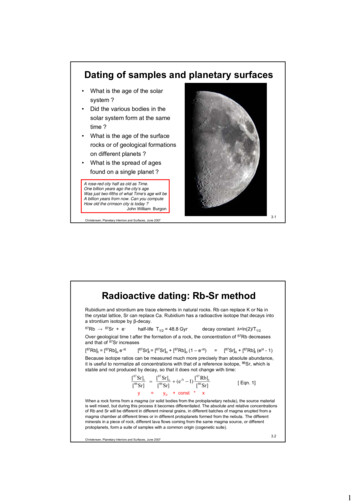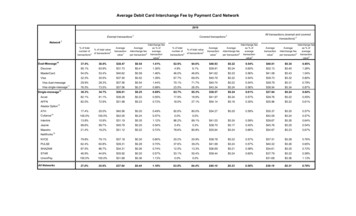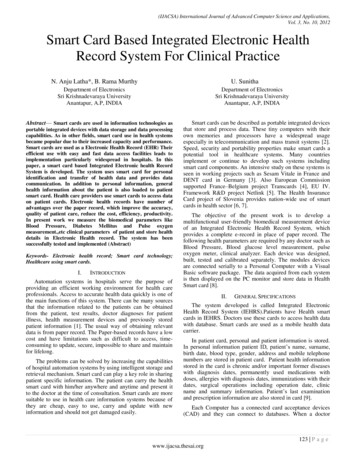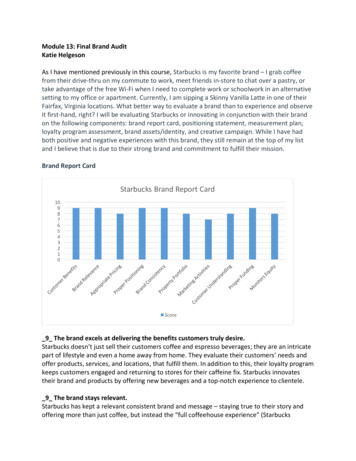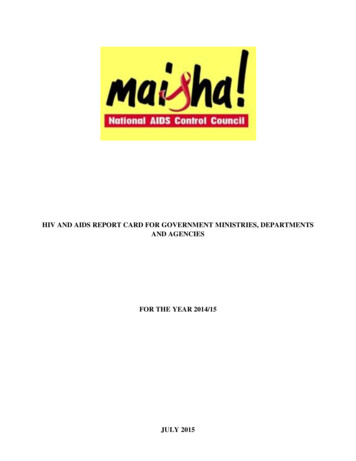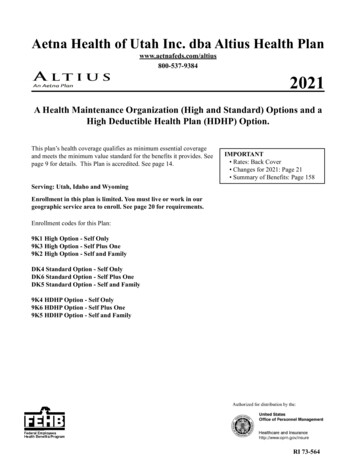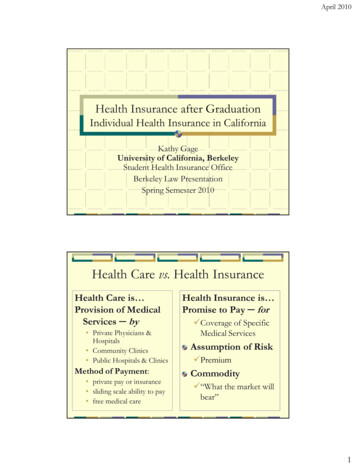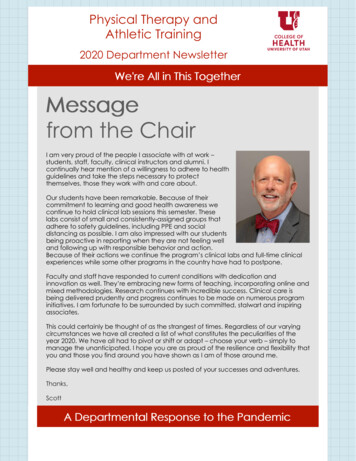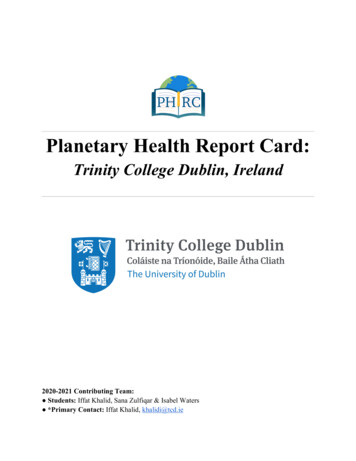
Transcription
Planetary Health Report Card:Trinity College Dublin, Ireland2020-2021 Contributing Team: Students: Iffat Khalid, Sana Zulfiqar & Isabel Waters *Primary Contact: Iffat Khalid, khalidi@tcd.ie
Summary of FindingsNote: Include strengths, weaknesses, and recommendations. Try to limit to 1 page.Curriculum The medical curriculum at TCD includes a module called ‘Global Health’ which covers aspects of sustainabledevelopment. However, it does not fully cover the concepts of Planetary Health or Climate Change. Similarly,the core curriculum does not fully cover the aforementioned topics but does cover it in some relevant modulessuch as Parasitology.The use of online modules such as the ‘global health’ module is an interesting approach, allowing for quickimplementation, taking advantage of existing learning materials. We believe this approach should be developedfurther.Interdisciplinary Research DThere are few funded opportunities for student-led initiatives within the medical school. There are some prizesfor environment-related art exhibitions etc., run by the university, but no direct funding for student research. Interms of the School of Medicine’s curriculum, there may be some essay or project choices that relate to planetaryhealth.Sustainability F Neither the medical school or its affiliated hospitals have any significant involvement with any communityoutreach or advocacy programmes. However, the institution overall does run a number of events in associationwith organisations focused on planetary health and the environment. There are plenty of opportunities for studentsto get involved in such organisations.Support for Student-Led Initiatives DTCD as institution has research opportunities and investment in planetary health and advocacy but most of itremains outside the domain of school of medicine.Community Outreach and Advocacy DA-TCD regularly publishes sustainability reports, the latest being in 2018 where it targets, reflects and sets newgoals for sustainability in the coming years. Overall, has TCD made impressive efforts to become moresustainable.The school of medicine could benefit from taking a more active role in the work being made by the institution,especially in relation to potentially influencing affiliated hospitals and other healthcare settings affiliated with theschool.1
Statement of PurposePlanetary health is human health.The Planetary Health Alliance defines planetary health as “a field focused on characterizing thehuman health impacts of human-caused disruptions of Earth's natural systems.” This definition isintentionally broad, intended to encompass the multitude of ways that the environment can affecthealth, including water scarcity, changing food systems, urbanization, biodiversity shifts, naturaldisasters, climate change, changing land use and land cover, global pollution, and changingbiogeochemical flows. The health of humanity is dependent on our environment and ourenvironment is changing rapidly and in disastrous ways. Although the World Health Organizationhas called climate change “the greatest threat to global health in the 21st century,” many medicalschool’s institutional priorities do not reflect the urgency of this danger to human health.As future health professionals, we must be prepared to address the impacts of human-causedenvironmental changes on our patients’ health. This preparation is in the hands of the institutionsproviding our medical training. It is imperative that we hold our institutions accountable foreducating medical students about the health impacts of climate change and other anthropogenicenvironmental changes, generating research to better understand health impacts and solutions,supporting related student initiatives, embracing sustainable practices as much as possible, andengaging with surrounding communities that are most affected by environmental threats. Becauseclimate change and environmental threats disproportionately affect vulnerable populations (forexample, communities of color, older adults sensitive to health threats, and individuals in lowresource settings), these issues are inherently ones of equity and justice.With the purpose of increasing planetary health awareness and accountability among medicalschools, we have created a Planetary Health Report Card that medical students internationally canuse to grade and compare their home institutions on an annual basis. This medical-student-driveninitiative aims to compare medical schools on the basis of discrete metrics in five main categoryareas: 1) planetary health curriculum, 2) interdisciplinary research in health and environment, 3)university support for student planetary health initiatives, and 4) community outreach centered onenvironmental health impacts 5) medical school campus sustainability.2
Planetary Health CurriculumSection Overview: This section evaluates the integration of relevant planetary health topics into themedical school curriculum. Today's medical students will be on the frontlines of tackling the healtheffects of climate change. Therefore, it is critical that medical students are trained to understand thehealth effects of climate change, as well as planetary health more broadly. Topics like the changinggeography of vector-borne diseases, the health consequences of air pollution, environmental healthinequities, and disaster response principles must be part of every medical school's core curriculum.Curriculum: General1. Did your medical school offer elective courses to engage students in Education for SustainableHealthcare or Planetary Health in the last year?3*Yes, the medical school has offered more than one elective whose primary focus isESH/planetary health in the past year.2Yes, the medical school has offered one elective whose primary focus is ESH/planetaryhealth in the past year.1The medical school does not have any electives whose primary focus is ESH/planetary health,but there are one or more electives that include a lecture on planetary health.0No, the medical school has not offered any electives on planetary health or electives that includeESH/planetary health topics in the past year.Score explanation: An online elective called ‘Global Health MOOC - Achieving SustainableDevelopment’ from ‘Future Learn’ was offered to 4th-year medical students in the summer 2020. Themodule included learning outcomes such as ‘critically explore the UN SDGs framework’ and‘understand how the impact of sustainable development can be measured’https://www.futurelearn.com/Curriculum: Health Effects of Climate Change2. Does your medical school curriculum address the relationship between extreme temperaturehealth risks and climate change, as well as the socioeconomic/racial disparities in extreme heatexposure?3This topic was explored in depth by the core curriculum.2This topic was briefly covered in the core curriculum.1This topic was covered in elective coursework.0This topic was not covered.3
Score explanation: This year, all 3rd-year medical students must complete the ‘Global HealthAchieving Sustainable Development’ course in 2nd semester as part of the 3rd-year curriculum over a4-week period.It has become part of the following module ADVANCED CLINICAL AND PROFESSIONAL PRACTICEand is worth 20% of the module’s grade. At the end of the 4-week period, all students must answer a setof 5 MCQs to ensure their knowledge is satisfactory on the course.The module is designed in partnership between the School of Medicine at Trinity College Dublin andFutureLearn; it is interdisciplinary, with contributions from the Schools of Medicine, Psychology,Microbiology, Environmental Engineering and The Centre for Global Health, and is an opportunity forundergraduate medical students at TCD to develop their understanding of emerging health issues inIreland and their relationship to global health and international development.The module briefly covers several topics in relation to planetary health and sustainable development.3. Does your medical school curriculum address the impacts of extreme weather events onindividual health and/or on healthcare systems?3This topic was explored in depth by the core curriculum.2This topic was briefly covered in the core curriculum.1This topic was covered in elective coursework.0This topic was not covered.4. Does your medical school curriculum address the impact of climate change on the changingpatterns of infectious diseases?3This topic was explored in depth by the core curriculum.2This topic was briefly covered in the core curriculum.1This topic was covered in elective coursework.0This topic was not covered.Score explanation: In the ‘Infection and Immunity’ module in the 2nd year 1st semester, therelationship between climate change and parasitic diseases is outlined as part of the Parasitology partof the module. In addition, is neglected tropical diseases (NTDs) and the 10 failings in global NTDsoutlined. Of note, one of the failings is climate change.5. Does your medical school curriculum address the cardiorespiratory health effects of climatechange, including air pollution?4
3This topic was explored in depth by the core curriculum.2This topic was briefly covered in the core curriculum.1This topic was covered in elective coursework.0This topic was not covered.Score explanation: In the Laboratory and Investigative Medicine module (MDU33002) in 3rd-year, wehave briefly discussed air pollution as a risk factor for respiratory pathologies, such as chronicbronchitis and lung cancers.6. Does your medical school curriculum address the mental health and neuropsychological effectsof environmental degradation and climate change?3This topic was explored in depth by the core curriculum.2This topic was briefly covered in the core curriculum.1This topic was covered in elective coursework.0This topic was not covered.7. Does your medical school curriculum address the relationships between health, individualpatient food and water security, ecosystem health, and climate change?3This topic was explored in depth by the core curriculum.2This topic was briefly covered in the core curriculum.1This topic was covered in elective coursework.0This topic was not covered.Score explanation: While food and water security and ecosystem health are covered in theaforementioned ‘Global Health’ module, these topics are not explored explicitly in relation to climatechange.8. Does your medical school curriculum address the outsized impact of climate change onmarginalized populations such as those with low SES, women, communities of color, children,homeless populations, and older adults?3This topic was explored in depth by the core curriculum.2This topic was briefly covered in the core curriculum.5
1This topic was covered in elective coursework.0This topic was not covered.9. Does your medical school curriculum address the unequal health impacts of climate changeglobally?3This topic was explored in depth by the core curriculum.2This topic was briefly covered in the core curriculum.1This topic was covered in elective coursework.0This topic was not covered.Curriculum: Environmental Health & the Effects of Anthropogenic Toxins on Human Health10. Does your medical school curriculum address the reproductive health effects of industryrelated environmental toxins (e.g. air pollution, pesticides)?3This topic was explored in depth by the core curriculum.2This topic was briefly covered in the core curriculum.1This topic was covered in elective coursework.0This topic was not covered.11. Does your medical school curriculum address important human-caused environmentalthreats that are relevant to the university’s surrounding community?3This topic was explored in depth by the core curriculum.2This topic was briefly covered in the core curriculum.1This topic was covered in elective coursework.0This topic was not covered.12. Does your medical school curriculum address the unique climate and environmental healthchallenges that have impacted and are impacting Indigenous communities?3This topic was explored in depth by the core curriculum.2This topic was briefly covered in the core curriculum.6
1This topic was covered in elective coursework.0This topic was not covered.13. Does your medical school curriculum address the outsized impact of anthropogenicenvironmental toxins on marginalized populations such as those with low SES, women,communities of color, children, homeless populations, and older adults?3This topic was explored in depth by the core curriculum.2This topic was briefly covered in the core curriculum.1This topic was covered in elective coursework.0This topic was not covered.Curriculum: Sustainability14. Does your medical school curriculum address the environmental and health co-benefits of aplant-based diet?3This topic was explored in depth by the core curriculum.2This topic was briefly covered in the core curriculum.1This topic was covered in elective coursework.0This topic was not covered.15. Does your medical school curriculum highlight the waste generated by the healthcare systemand identify ways to advocate for and implement sustainable best practices in health care?3This topic was explored in depth by the core curriculum.2This topic was briefly covered in the core curriculum.1This topic was covered in elective coursework.0This topic was not covered.Curriculum: Clinical Applications16. In training for patient encounters, does your medical school’s curriculum introduce strategiesto have conversations with patients about the health effects of climate change?7
2Yes, there are strategies introduced for having conversations with patients about climate changein the core curriculum.1Yes, there are strategies introduced for having conversations with patients about climate changein elective coursework.0No, there are not strategies introduced for having conversations with patients about climatechange17. In training for patient encounters, does your medical school’s curriculum introduce strategiesfor taking an environment
Planetary Health Report Card: Trinity College Dublin, Ireland 2020-2021 Contributing Team: Students: Iffat Khalid, Sana Zulfiqar & Isabel Waters *Primary Contact: Iffat Khalid, khalidi@tcd.ie . 1 Summary of Findings Note: Include strengths, weaknesses, and recommendations. Try to limit to 1 page. Curriculum D The medical curriculum at TCD includes a module called ‘Global Health’ which .
